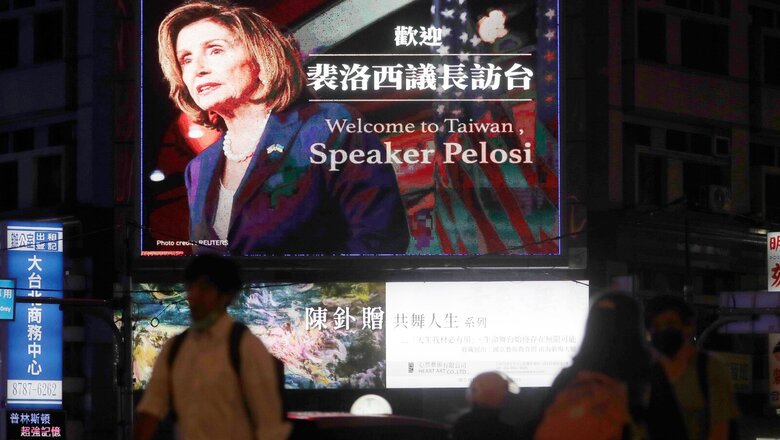
views
Events of this week are a geopolitical aficionado’s dream. While the US finally eliminated Al-Qaeda chief Ayman al-Zawahiri 21 years after 9/11 attacks, the entire world held its breath as US House of Representatives Speaker Nancy Pelosi’s much controversial visit to Taiwan unfolded. For many, it signals the beginning of an era, a precursor to direct military confrontation between the US and China as the latter becomes a principal challenger to American hegemony and the former tries to show China its rightful place by supporting Taiwan’s independence.
But there is a slight plot twist. The US policy on Taiwan’s independence hasn’t changed with this visit as the statements that have come out from the top leaders demonstrate. During a White House press briefing, National Security Council spokesperson John Kirby said that the US continues to maintain its own ‘One China’ policy which means it still doesn’t support Taiwan’s independence. But the US continues to provide defensive weapons to Taiwan under the Taiwan Relations Act 1979. Pelosi also repeated the same: that her visit was one of the many Congressional visits to Taiwan and it doesn’t change the US’ long-standing policy on the issue.
These statements have come in the backdrop of reports that the Biden administration tried its best to defuse tensions with China ahead of her visit. This includes a very public admission by Joe Biden himself that the military won’t consider it as a good idea right now. However, separation of powers is mandated by the US Constitution and the executive can’t control Congressional visits leaving very little choice for Biden to do anything.
While the US has gained a favourable public opinion for taking China head-on and calling out its bluff of interfering with Pelosi’s flightpath if she landed in Taiwan, the US itself is making every effort to undertake a tentative rapprochement with China. Unlike the popular view that is praising the US for standing up to Chinese bullying, the Biden administration is still not declaring any open challenge. According to the White House, there are areas where both countries can still cooperate.
But what are the implications of Pelosi’s visit, at least as viewed from the Chinese perspective? The optics of the visit from the very beginning were so bad that they were meant to sour the already strained US-China relationship. While it is true that there is nothing unprecedented about Pelosi’s visit because in 1997 as well, a Speaker of the US House had visited Taiwan. But this time, Mark Milley, Chairman of the Joint Chiefs of Staff, had said that military support will accompany Pelosi in her visit to Taiwan because it was “world’s hottest spot for a mishap”.
It was this mention of military support that rattled Beijing, leading it to view the visit as a provocation. China’s defence ministry stated on record that it viewed Nancy’s visit as a move to support “Taiwan independence” and it won’t “turn a blind eye” to it. According to China, this visit will cause “extremely serious damage” to ties between the two countries.
This response by China to Pelosi’s visit needs to be seen through two prisms — one of China’s increasingly assertive claims in the Taiwan strait; and, second of Xi Jinping’s need to be seen as a strong leader in front of his domestic audience.
First, there is no denial of Chinese expansionism in the Taiwan strait. In June this year, China declared that Taiwan straits are “China’s internal waters, territorial sea, contiguous zone and exclusive economic zone in that order”. This led the US State Department to call it an “international waterway” and send an anti-submarine aircraft to the straits. China responded by sending 29 fighter jets of its own into Taiwan’s air defence identification zone.
It is because of this very reason that despite the US’ clear articulation of no change on Taiwan policy, China has escalated military activities in the region after Pelosi’s visit. It is a God-sent pretext that China could have only wished for. Hu Xijin, commentator and former Chief Editor of Global Times, a CCP mouthpiece tweeted, Pelosi’s visit has opened, “an era of high-intensity competition between China and US over Taiwan Strait”. China is more than likely to use it as a provocation to assert further control in the region.
There is also a serious need for Xi Jinping to use this opportunity to secure his own claim to power. He is seeking an unprecedented third term in power and he can’t risk being seen as a weak leader who can’t protect China’s core interests. In fact, the Pelosi visit has given him a golden chance to play to the domestic gallery by taking its attention away from more glaring problems like the growing economic challenges.
The US is itself trying to underplay the visit to avoid any confrontation, but Pelosi’s visit has unintentionally exposed China’s growing expansionist designs to the world. Taiwan’s Ministry of Defence condemned China in unequivocal terms by highlighting how it exposes its mentality to use force in order to settle differences. Taiwan termed it as a move that will hurt China’s international image and will not be received well by the people on both sides of the strait.
Indeed, Taiwan has emerged to be the better of the two by showing its unwavering commitment to democracy and a free and open Indo-Pacific as expressed by Taiwanese President Tsai Ing-Wen.
The author is a PhD in International Relations from the Department of International Relations, South Asian University. Her research focuses on the political economy of South Asia and regional integration. Views expressed are personal.
Read all the Latest News and Breaking News here




















Comments
0 comment